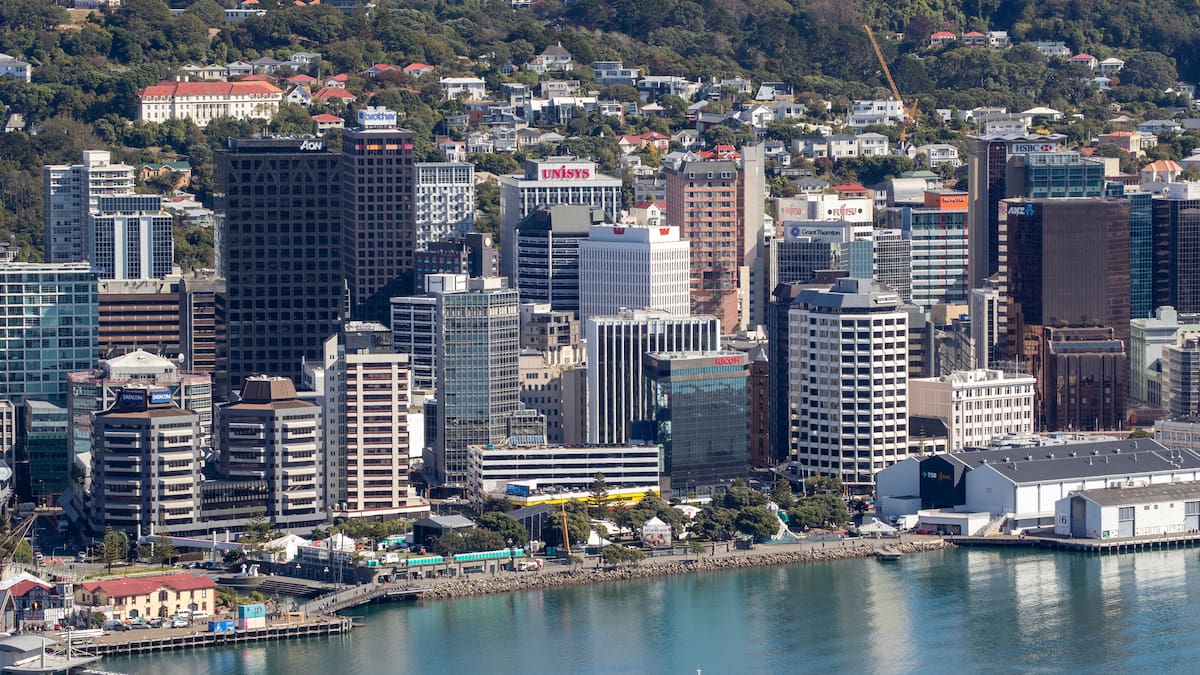Wellington City Council’s business support, or lack thereof, drew strong reaction from the business leaders.
When it came to satisfaction with the council’s performance in supporting the business community and local economy, a majority at 57.5% were very unsatisfied and 15% were moderately unsatisfied, compared with 25% who rated the council’s performance as average, and only 2.5% – meaning one businessperson – was moderately satisfied. None surveyed ticked very satisfied.
Office workers at lunchtime in the Wellington CBD. Photo / Mark Mitchell
Asked about their direct dealings with the council, 32.5% rated the council’s interaction with their businesses as average, 35% were very unsatisfied, 25% were moderately unsatisfied, 2.5% were moderately satisfied, and two businesspeople, at 5%, were very satisfied.
A majority did not think supporting and growing business in Wellington was something that mattered to the council.
But the council’s chief economic and engagement officer Anna Calver disagreed, telling the Herald that while there are “certainly improvements to be made, we’re on the right path and are committed to being a more business friendly organisation”.
Calver said the chamber’s survey is based on a small sample size and the council’s own surveys paint a different picture.
She said investing in businesses and economic recovery is essential for growth, pointing to investments in things like WOW, Tākina, and promotional initiatives through WellingtonNZ as examples.
The council’s strained relationship with central Government, which has deteriorated into a frequent war of words between Mayor Tory Whanau and the Prime Minister this term, was seen as an issue by the business leaders, none of whom thought the relationship was good.
There was broad consensus among the respondents on several major policies and projects in the city.
A review into the commercial rating differential, which in Wellington is currently the highest of any comparable centre, was supported by 65%, 32.5% did not know, and 2.5% preferred the status quo.
Wellington businesses pay an average of $20,000 more in commercial rates than those in other cities, according to numbers revealed by the Herald in June.
Amalgamation of the region’s councils, which has long been discussed in Wellington as a possible solution to region-wide challenges, was largely supported with 60% in favour, 15% opposed, and 25% unsure.
The contentious $116m Golden Mile project, which is underway at the top of Courtenay Place and will transform the stretch, giving more space to pedestrians, buses and cyclists, rather than private vehicles, was opposed by 57.5%, while 25% were on board with it going ahead, 17.5% were unsure.
Wellington City Council’s design for the Golden Mile, Courtenay Place. Image / WCC
Rates capping, which central Government is currently exploring, was supported by businesses at 67.5%, 17.5% were opposed and 15% didn’t know.
The survey also included a mayoral poll, with the business owners asked which mayoral hopeful they trusted to best manage the capital’s economy.
Many either did not know or said none of the candidates, at 35% and 10% respectively.
Andrew Little came out on top with 25% support, the third poll to have the former Labour leader as a front-runner.
Former Labour Party leader Andrew Little is running for the Wellington mayoralty. Photo / supplied.
Behind Little was current councillor Diane Calvert at 12.5% support, Karl Tiefenbacher on 10%, and Ray Chung at 7.5%, a significant fall from initial polling which had him on top before his campaign was torpedoed by scandal.
Chamber of Commerce acting chief executive Amanda Wood says the survey shows the need for pro-business change at council.
“Building a pro-business Wellington is in the interest of all Wellingtonians and something the city must pursue as a priority,” Wood said.
“Recent years have tested us all, with Wellington businesses facing huge challenges and change, so it comes as no surprise that the relationship between council and business is at a low point.”
Wellington Chamber of Commerce acting CEO Amanda Wood.
In the chamber’s pre-election report, it pitched its plan to revive the city’s “stagnant” economy by urging the council to cut commercial rates, push long-debated regional amalgamation, and launch an aggressive PR campaign to rebrand the city.
Recent figures have shown the scale of the capital’s economic malaise; in the past year to the end of the June quarter, 177 businesses closed down, Infometrics said in its latest Quarterly Economic Monitor.
It showed the local economy had shrunk, but appeared to have hit rock bottom following the fallout of layoffs in the public sector.
Those Infometrics figures led to an economic blame game among local leadership.
Economic Growth Minister Nicola Willis conceded the public sector cuts have had an impact, but said the city has been going through a difficult time “both in terms of its local leadership and a sense that it hasn’t had a focus of where growth is going to come from”.
Mayor Tory Whanau said Willis was “desperate to deflect responsibility for the economy from anyone but herself”.
Other economic monitoring by ASB last month showed Wellington had slumped to the bottom of the economic scoreboard.
Ethan Manera is a Wellington-based journalist covering Wellington issues, local politics and business in the capital. He can be emailed at ethan.manera@nzme.co.nz.

